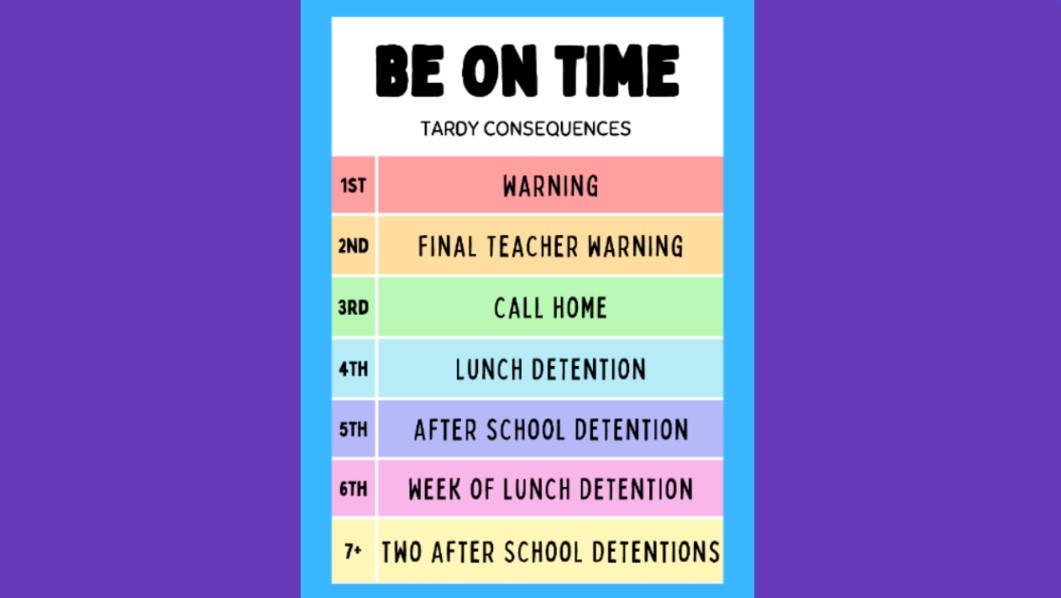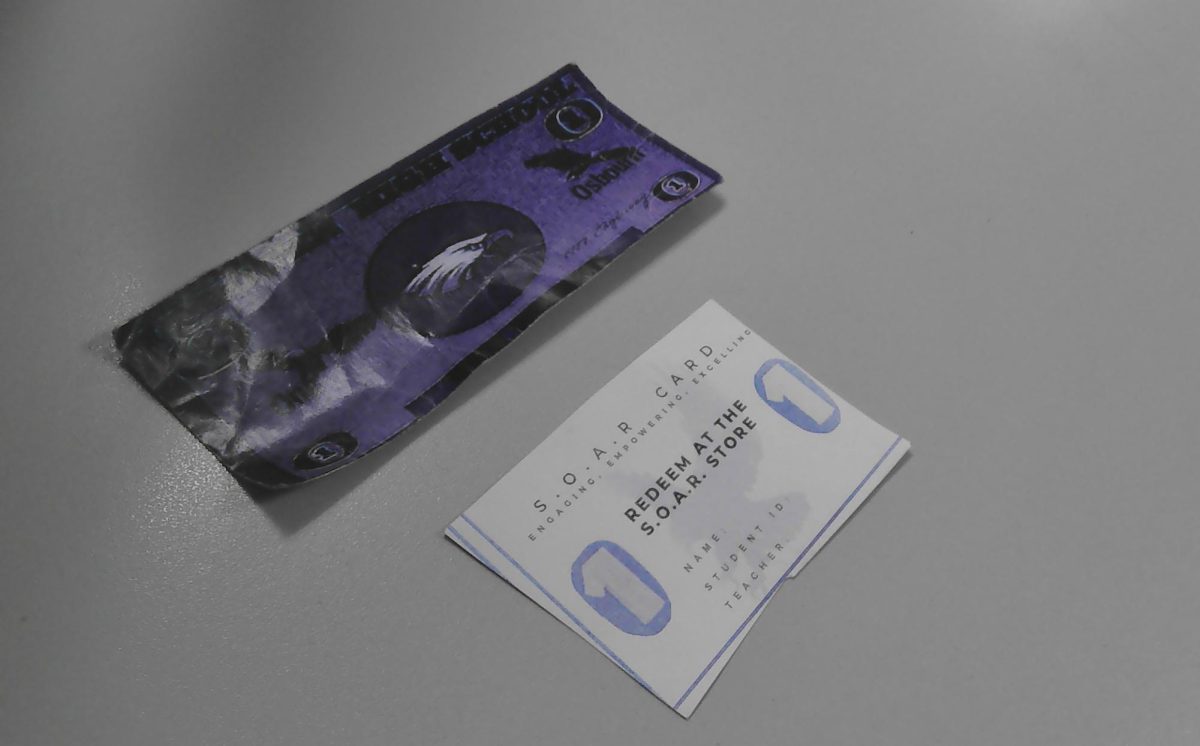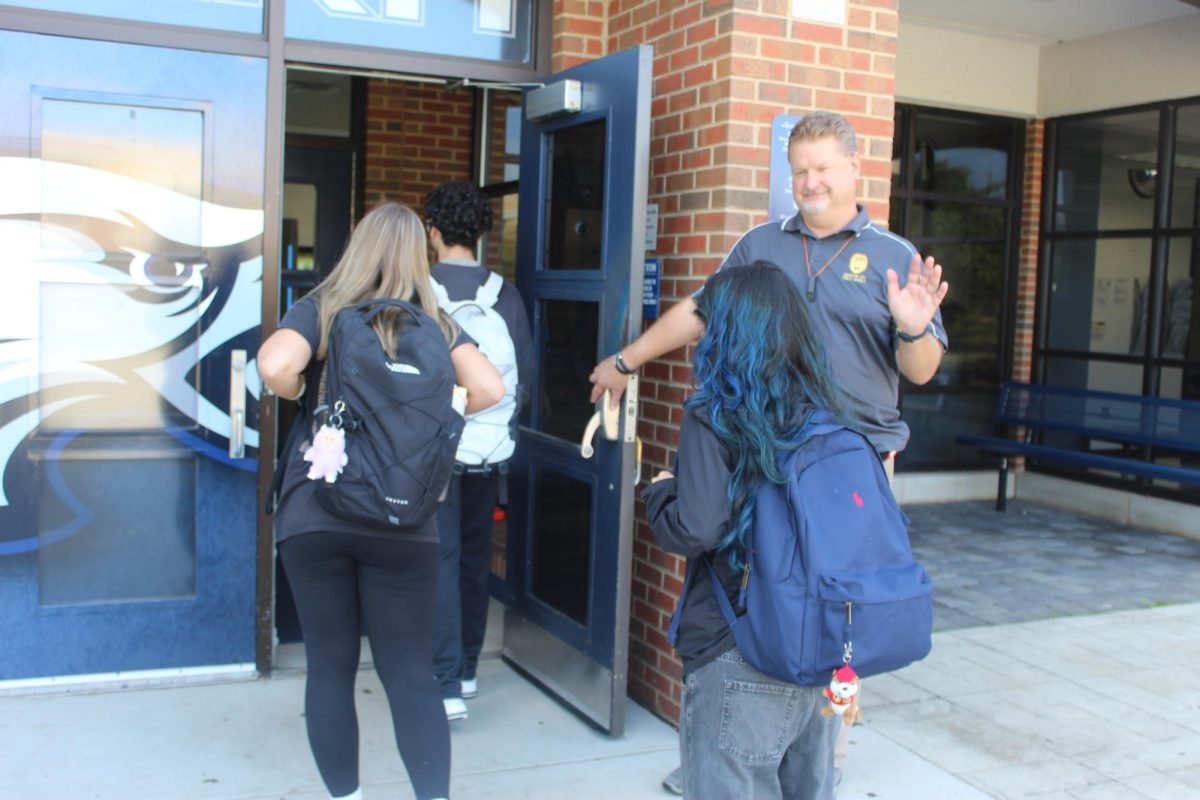As of March 17, 2025, Osbourn’s new tardy policy has been in place. This policy has been enacted across the school due to the accumulated time students have spent outside of class during the school day. This policy hopes to reduce this time. Tardiness here is defined as not having crossed the threshold of the doorway to the classroom after the bell rings. This policy affects the student body directly. So, what is the response of the student body at Osbourn to this new policy?
Teachers, security, and administrators are expected during transitions and before the start of the block to be monitoring the students’ behavior and welcoming them into class. When the warning bell, or the music starts to play, the snack cart immediately closes and the staff are expected to politely encourage students to get to class and greet them when they come in.
Students are expected to be in class once the bell rings and will be defined as late if they are not in the threshold of the doorway. When the bell is finished ringing, the classroom door should be closed and locked. If a student happens to not be in the threshold of the door when the bell rings and the door is closed and locked, the student must be admitted by a teacher and sign the classroom tardy log.
The teacher must keep this paper and log the tardy into PowerSchool for this procedure. The consequences are after each tardy. The first two tardies are warnings from the teachers, the third is a call home, the fourth is a lunch detention, the fifth is after-school detention, the sixth is a week of lunch detention, and the seventh tardy is two after-school detentions.
To support the implementation of this procedure, a video explaining the new policy was shown during the morning announcements. Teachers then reviewed the definition of tardiness and the process of this procedure. Teachers also posted the tardy process posters that were provided by the administration.
Lastly, community communication was conducted by the administration. This allowed parents and students to understand the need for the new policy.
Many students’ opinions have been shared on this. Some agree and some disagree. Some believe the pros are that the students get to class quicker, and some believe the cons are that students are punished if they are late because of the crowded hallways or the breakfast line. Some believe that there should be exceptions to this new policy, and some believe it is fine the way it is. Students who regularly are on time for their classes have no problem with the new policy, though there is consideration for the students who come late for a valid reason. Here are some students’ opinions showing this.
“This policy is unreasonable in my opinion. In the mornings, I hang out with my friends in the cafeteria. Even if I leave to go to JLC as soon as the warning bell rings, the music still starts playing before I’m even up the JLC stairs. I think there should be a little more time for transition,” said freshman Jackson Doll.
“A pro of this policy could be that some students are getting to class quicker, but a con could be that it unfairly punishes students who have to walk across the entire school for their next class,” said Doll.
“It will hopefully lower our students’ tardiness and keep them focused on their school work. The cons are that most students won’t listen or will just ignore it, and the consequences are too strict for something as simple as walking through the door a second late,” said freshman Em Ingram.
“The pros are that people have fixed their attendance and their tardies and the cons are that if a student gets stuck behind getting breakfast or comes late to school but not late enough to get a pass and they have to sign the paper and then they get in trouble for that,” said freshman, Fatima Melgar.
“Even though in some cases grades correlate with attendance, it’s also the attitude of the students if they want to learn and how a teacher teaches that affects grades,” said Ingram
“Students who have asthma or disabilities should be given more time, so they don’t have to run to class,” said Doll.
“I don’t really mind the new policy. It’s not that bad if you’re on time for class most of the time,” said Rosa Brizuela, a freshman at OHS. “I don’t really care about it because I’m usually in class when the bell rings. But I can see how it’d be annoying at times,” said Sophia Espinoza, another 9th grader at OHS.
“There are some students from JLC who end up being marked tardy because JLC is pretty far away, depending on where the next class is,” said Espinoza, who talks about the issues of the new tardy policy with students who have classes in the JLC building. This can be a problem, considering how JLC is a separate building and it takes time to walk to class, even with a decent transition time between classes.
When asked about why this tardy policy was put in place, students responded with their own opinions on why. “I think it’s because there were a lot of people walking around in the hallways, so Dr. Chapman gave them consequences now,” responded Brizuela. “To have students be on time for class and not skip classes,” said Espinoza. It is clear that the reason why this policy was put in place is to prevent students from being late to class by being stricter about tardiness.
Though it does beg the question, has this policy actually worked for students? “I wouldn’t know because I don’t pay attention to whether students are on time, but I would say yes,” said Espinoza. “It is because a lot of people in my classes used to walk around in the hallways after the bell rang and then go to class like 10 minutes later. Now most of them are on time for class,” said Brizuela.
This policy specifically targets the amount of educational class time students take part in. So the question is, has it improved and prolonged class time per its intention, or has it had a negative effect on it? Sophomore Cristopher Martinez says, “The new tardy policy has a very negative effect on my class time due to the fact that teachers take every second of transition seriously. Even if you are just one second late, they hand you a paper, and that does not help the students wanting to learn or the teachers needing to teach.” Sophomore Stella Bittinger also adds, “The new policy only has a negative effect when I have to walk from upstairs JLC to upstairs A wing because there are a lot of people in the hallways.”
In this new policy, there is a punishment for each accumulated tardy per class. For the first two tardies gained, the punishments are warnings. The third is parental contact. Fourth tardy and so on are given an administrative referral with progressive discipline. Some students have already experienced these punishments and believe that “the first two warnings are great to start with because some students sometimes have trouble getting to their first class in the morning due to situations out of their control, whether it is transportation, sports. or even church,” said Martinez. While some have experienced the consequences, others haven’t and adapted to the policy: “I usually get to class on time or run when the music starts playing,” said Doll.
While the policy was only implemented in March of this school year, it will most likely continue into the next school year. Students may agree with this policy going into their future years here. “I believe that the tardy policy would be something good for future years. It will help with the rising freshmen to start with the principle of getting to class on time,” said Martinez. While other students do not wish to see this policy continued any further. “This rule shouldn’t continue because it’s just too much work, and I only ever see people come in a minute late, which isn’t even bad,” said Bittinger.
Again, while the policy was only implemented just two months ago, students have already had their own ideas on ways to improve this policy, where they see it as faulty. “I would have the policy account for the distance students have to walk to get to their next class, and if there’s anything currently happening in the hallway, such as a fight,” said Doll.
So, now knowing all this information, do you have any thoughts or opinions on the new tardy policy? Do you think it is effective? Tell us in the comments!
















Larry Lizalde • May 27, 2025 at 2:13 pm
I am on time with all my classes but this policy made me start intentionally going late to some of my classes knowing that I wouldn’t be punished. Making my tardies count in a way
Fatima Melgar • May 20, 2025 at 10:49 am
I like the new policy because before so many people would be late to class and disrupt the lecture and would take time away from the other students and now students are rushing to get to class so I like the policy.
Pamela Qurioz Santiago • May 19, 2025 at 3:16 pm
I think that the policy could work if there weren’t people going from the other building to this building at all time. Hallways are always full of people and it is very difficult to walk faster.
Ian Knox • May 14, 2025 at 9:57 am
I find the policy a little frustrating because like Jackson said, it’s difficult to get to JLC in 6 minutes. I come from JLC on B days for my third and I have to go all the way across the school, up the stairs to 2051. If they want this policy, they should give us more transition time or be understanding of students schedules, as well as aware of the large amount of students the school has.
Teysi Rivas • May 14, 2025 at 4:57 am
I personally think this policy will really help students do better with their attendence.
Jackson Doll • May 12, 2025 at 1:56 pm
I think the policy has pros and cons, but I definitely think they should give us more transition time between classes with the implementation of this policy.
Engel Diaz Diaz • May 8, 2025 at 3:05 pm
I think that the tardy policy has been effective and is beneficial for the school. It is very useful because it makes sure that students get to their classes on time. This article is probably the longest article on the website but it has the most information about its topic to compensate for its length
Josh Guzman • May 8, 2025 at 1:01 pm
To be honest, this policy really doesn’t affect me at all because I am on time with all of my classes. I see this as a good thing though because it encourages students to actually be on time. It can have its problems though. If you need to go from JLC to the other building in such a low amount of time, then that’s when I can see the issue with this policy. Otherwise, if I am really far from a class, I would probably be the first out to get there as quickly as possible to prevent getting stuck in crowds. Overall, I think it is necessary and effective to prevent more tardies from swarming the school.